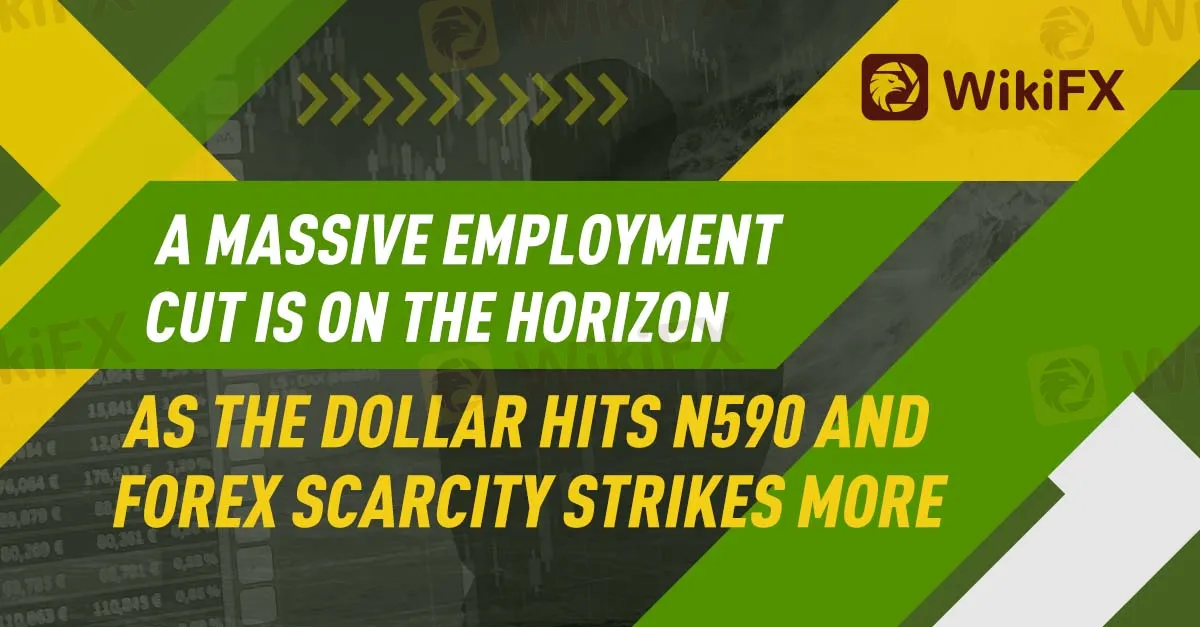A MASSIVE EMPLOYMENT CUT IS ON THE HORIZON AS THE DOLLAR HITS N590 AND FOREX SCARCITY STRIKES MORE
Abstract:Even as the parallel market exchange rate approaches N590/$1, the country's ongoing foreign exchange scarcity has worsened.

Even as the parallel market exchange rate approaches N590/$1, the country's ongoing foreign exchange scarcity has worsened.
According to the Manufacturers Association of Nigeria, the development may result in enormous job losses in the manufacturing industry, among other areas.
The event comes more than eight months after the Central Bank of Nigeria suspended the selling of foreign currency to Bureau de Change operators and promised to increase liquidity in commercial banks.
Checks revealed that the black-market exchange rate was N585/$1 and N785/£1 as opposed to N582/$1 last Friday.
This comes on the heels of banks restricting clients' access to currency by imposing a monthly restriction of $20 for online transactions. It was revealed that conditions might deteriorate much more when electioneering begins, with politicians beginning to hoover up funds, pushing increasing demand.
“The naira will continue to collapse because individuals in need of dollars would turn to the secondary market, boosting demand.” It's also one of the consequences of an election year. We are not generating as much foreign currency and will have to spend more money on gasoline subsidies. “Ultimately, the gap between the import and export window and the illicit market will widen,” a government source who requested anonymity said.
Mr. Bismarck Rewane, Chief Executive Officer of Financial Derivatives Company, predicted in January that the CBN would devalue the naira by the end of 2022, adding that spending on political campaigns ahead of the 2023 general elections would put additional strain on the Nigerian economy's foreign exchange supply.
Manufacturers and travelers who are frustrated have already been obliged to use BDC operators more frequently than previously.
It was discovered that banks were only able to satisfy roughly 30% of their clients' needs in some cases.
“I used the CBN online to apply for a $5,000 Business Travel Allowance.”
“However, my bank stated it could only pay me $2,000,” a businessman who chose to remain unnamed said. However, it was discovered that the experiences of producers were significantly worse.
“Never in a million years would I have imagined Nigeria getting to this point.” How do you explain a firm that has an invoice for $425,000 to import supplies but only received $210 from the CBN? “I can't even put my head around that,” Bola Adefila, Chief Operating Officer of Banrut Rolls Nig Ltd, said.
It was learned that the MAN has begun reaching out to the Federal Government for immediate help, despite the fact that the growing cost of diesel has made conducting business more difficult.
Segun Ajayi-Kadir, Director-General of MAN, stated in a discussion that manufacturers increasingly rely on the illicit market for foreign exchange.
According to Ajayi-Kadir, the high cost of diesel and the paucity of foreign currency have significantly raised the cost of manufacturing, and businesses may be obliged to lay off some workers in order to cope with the new reality.
He also advocated for the reopening of northern land borders to allow gasoline merchants to import diesel from neighboring countries like Niger and Chad, both of which have operational refineries.

Related broker





Read more

Europe’s High-Stakes Gamble: Can It Bridge the U.S.-Ukraine Divide?
European leaders are working to repair Ukraine’s damaged relationship with the United States. Britain and France are leading a group of nations to create a plan to end the war with Russia. They hope to gain support from U.S. President Donald Trump, who has been hesitant about continued involvement.

Gold Crashes: Is the Bull Run Ending?
International gold prices, which once approached the $3,000 per ounce mark, have started to decline. Has investor focus shifted? Is the gold bull market coming to an end?

Revealed: How Investors Made 4.43 Trillion Naira in the Market
The Nigerian stock market experienced a significant surge in the first two months of 2025, with investors gaining ₦4.43 trillion. Behind this bullish trend, policy adjustments, market expectations, and capital flows played a crucial role.

Malaysia’s EPF Declares Highest Dividend Since 2017 Amid Market Resilience
Malaysia’s Employees Provident Fund (EPF) has announced a 6.3 per cent dividend for both its conventional and syariah savings accounts for 2024. This marks the fund’s highest payout since 2017 and the first time both accounts have recorded the same rate. The unexpected increase is expected to encourage more voluntary contributions from members.
WikiFX Broker
Latest News
How Do You Make Money in the Forex Market in March 2025
Europe’s High-Stakes Gamble: Can It Bridge the U.S.-Ukraine Divide?
Crypto Trading: New Trend among Indian Youth
Botbro Creator, Lavish Chaudhary Unveils New Project
First UK Criminal Conviction for Unregistered Crypto ATMs Involves Over £2.5 Million
Consob Exercises MICAR Authority for the First Time, Shutting Down Unregistered Crypto Website
TD Bank Appoints Guidepost Solutions for AML Compliance Oversight
Malaysia’s EPF Declares Highest Dividend Since 2017 Amid Market Resilience
Tether’s USDT Hits $1.4 Billion on TON in Record Time
Revealed: How Investors Made 4.43 Trillion Naira in the Market
Rate Calc

